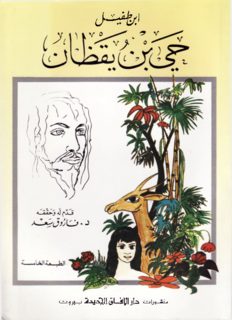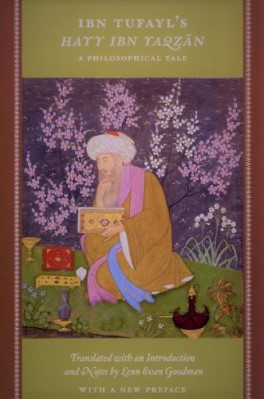Ḥayy ibn Yaqẓān (ي بن يقظان, lit. ‘Alive son of Awake’) is an Arabic philosophical novel and an allegorical tale written by Ibn Tufail (c. 1105 – 1185) in the early 12th century in Al-Andalus.] Names by which the book is also known include the Latin: Philosophus Autodidactus (‘The Self-Taught Philosopher’); and English: The Improvement of Human Reason: Exhibited in the Life of Hai Ebn Yokdhan. Ḥayy ibn Yaqẓān was named after an earlier Arabic philosophical romance of the same name, written by Avicenna during his imprisonment in the early 11th century, even though both tales had different stories. The novel greatly inspired Islamic philosophy as well as major Enlightenment thinkers. It’s the most translated text from Arabic, after the Quran and the One Thousand and One Nights.

It was “discovered” in the West after Edward Pococke of Oxford, while visiting a market in Damascus, found a manuscript of Hayy ibn Yaqdhan made in Alexandria in 1303 containing commentary in Hebrew. His son, Edward Pococke Jr. published a Latin translation in 1671, subtitled “The Self-Taught Philosopher.”George Keith the Quaker translated it into English in 1674, Baruch Spinoza called for a Dutch translation, Gottfried Wilhelm Leibniz championed the book in German circles, and a copy of the book went to the Sorbonne Daniel Defoe (c. 1660 – 1731), author of Robinson Crusoe, was heavily influenced by the work as well as by the memoir of the Scottish castaway Alexander Selkirk. In the Muslim world, the book is an honored Sufi text.
The story revolves around Ḥayy ibn Yaqẓān, a little boy who grew up on an island in the Indies under the equator, isolated from the people, in the bosom of an antelope that raised him, feeding him with her milk. Ḥayy has just learned to walk and imitates the sounds of antelopes, birds, and other animals in his surroundings. He learns their languages, and he learns to follow the actions of animals by imitating their instinct.
He makes his own shoes and clothes from the skins of animals, and studies the stars. He reaches a higher level of knowledge, of the finest of astrologists. His continuous explorations and observation of creatures and the environment lead him to gain great knowledge in natural science, philosophy, and religion. He concludes that, at the basis of the creation of the universe, a great creator must exist. Ḥayy ibn Yaqẓān lived a humble modest life as Sufi and forbade himself from eating meat.
Once 30 years old, he meets his first human, who has landed on his isolated Island. By the age of 49, he is ready to teach other people about the knowledge he gained throughout his life.
Hayy ibn Yaqdhan is an allegorical novel in which Ibn Tufail expresses philosophical and mystical teachings in a symbolic language in order to provide better understanding of such concepts. This novel is thus the most important work of Ibn Tufail, containing the main ideas that form his system.
Ibn Tufail was familiar with the differences in the ideas of Al-Ghazali and those of the “Neoplatonizing Aristotelianists” Al-Farabi and Ibn Sina. In Hayy ibn Yaqdhan, Ibn Tufail sought to present “a conciliating synthesis of the Islamic speculative tradition with al-Ghazālī’s Sufi-influenced recasting of Islamic mysticism and pietism.” Ibn Tufail borrows from Ibn Sina, using the title of one of his allegories and drawing inspiration from his Floating Man thought experiment, but transforming the subject’s sensory deprivation to social isolation.
With this novel, Tufail focuses on finding solutions to the three main problems discussed during his period:

- Humans, on their own, are able to reach the level of al-Insān al-Kāmil by merely observing and thinking of the nature, without any education.
- The information that is obtained through observation, experiment, and reasoning, does not contradict with revelation. In other words, religion and philosophy (or science) are compatible, rather than contradictory.
- Reaching the absolute information is individual and simply any human being is able to achieve that.
Read here: Hayy ibn Yaqdhan

